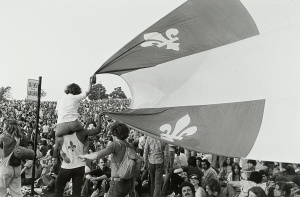This piece is another in our series of reflections on Canada 150. This one is written by Zacharie Leclair, administrative assistant for MCC Québec. Zacharie holds a Ph.D. in U.S. history and also serves on the Canadian Conference of Mennonite Brethren Churches Executive Board.
Celebrating the birth of the 150 year-old Canadian Confederation always feels awkward for inhabitants of a society that celebrated its 4th centennial not even a decade ago.
Even more incongruous, the very same year as Canada 150, Montreal is celebrating its 375th anniversary as a permanent and continued French settlement. Minimally, Québec’s attention is distracted, caught between two parties!
Aside from this chronological peculiarity, Québec also fosters a troubled relationship with its adhesion—never constitutionally formalized—to the Canadian Confederation. And only adding to this complex past, the name of Canada itself has caused much confusion over the years as to the Québécois identity.

In fact, “Canadian” has primarily and specifically referred to the first French settlers of the Saint-Lawrence valley in the 17th and 18th centuries. After the takeover of New France by the British in 1763 and subsequent English migration to Québec, “Canadian” gradually came to designate both French and English inhabitants of Canada—hence the need to add the qualifier of “French” to Canadian. Then, mainly through the initiative of the Anglophone merchant class of Montréal, the province of Québec was incorporated into the confederation project.
Reacting against the hegemony of the English-speaking minority in Québec, a distinctive nationalist sentiment grew throughout the first half of the 20th century and led to the extensive—and sometimes lyrical!—use of the word “Québécois” to describe those previously known as “French Canadians.” The implication was clear: only the Francophone should be considered as legitimate and moral “owners” of the province (after all, British rights over Québec were won—illegitimately by modern international law standards—through conquest).
Yet this new designation also led to the abandonment of the sense of Canadian belonging and, not without irony, the repudiation of a pan-Canadian Francophone unity and solidarity. However, the term “Québécois” came to symbolize both the modernization and the coming of age of the Québec society as of the 1960s, when an exceptionally sudden social and nationalist upheaval called “Révolution Tranquille” (Quiet Revolution) took place. Increasingly, being a Québécois thus also meant a clear disconnection with the idea of identifying as Canadian.

Many Anglophone observers and columnists resent the fact that most French-speaking Québécois, although they appreciate the July 1 holiday, disregard Canada Day to concentrate instead on Québec’s national “fête” on June 24. Called La Saint-Jean-Baptiste, this festival is an ancient Catholic carnival now practically devoid of any religious content and meaning.
This tendency to dismiss Canadian nationalism is also a symptom of the Québécois’ own brand of nationalism. Instead of focusing on celebrating diversity and the mixing of peoples into the Canadian “compact”, the Québécois focus on the fact that their society remains a haven of French language in North America, possessing a culture of its own that has survived intense Anglophone presence, influence, and even assimilation efforts. In short, Québécois do not celebrate the same “mystic chords of memory,” to borrow Abraham Lincoln’s words, as English Canadians.
However, millennial Québécois no longer feel as bitter and reactionary toward the Anglophone and federalism as their parents and grandparents did during the so-called “Quiet Revolution.” Obviously the conditions that had once created the rising against the Anglo-Protestant domination has but completely vanished.
Yet Québécois are still in search of a reason to celebrate the Confederation. Beyond the flags, the day off work, and the free music shows, what does it mean to highlight an event that, for people in this part of the country (not to mention the First Nations), may be remembered as painful?
Without an understanding of the historical roots of the Québécois’ mitigated reception of Canadian patriotism (including the old disregard of Canada Day), I fear no national anniversary will ever have any signification to anyone because there will be no truly united and sharing community to celebrate it.
From a Christian and a Québécois perspective, to “love your neighbor as yourself” should encompass knowing and loving the three founding nations of this country (the French, the English and the First Nations), and acknowledging the plight of those who at times were left behind.

One thought